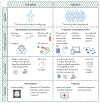Nutrition state of science and dementia prevention: recommendations of the Nutrition for Dementia Prevention Working Group
- PMID: 35821792
- PMCID: PMC9273104
- DOI: 10.1016/s2666-7568(22)00120-9
Nutrition state of science and dementia prevention: recommendations of the Nutrition for Dementia Prevention Working Group
Abstract
Observational studies suggest that nutritional factors have a potential cognitive benefit. However, systematic reviews of randomised trials of dietary and nutritional supplements have reported largely null effects on cognitive outcomes and have highlighted study inconsistencies and other limitations. In this Personal View, the Nutrition for Dementia Prevention Working Group presents what we consider to be limitations in the existing nutrition clinical trials for dementia prevention. On the basis of this evidence, we propose recommendations for incorporating dietary patterns and the use of genetic, and nutrition assessment tools, biomarkers, and novel clinical trial designs to guide future trial developments. Nutrition-based research has unique challenges that could require testing both more personalised interventions in targeted risk subgroups, identified by nutritional and other biomarkers, and large-scale and pragmatic study designs for more generalisable public health interventions across diverse populations.
Figures


References
-
- Scarmeas N, Anastasiou CA, Yannakoulia M. Nutrition and prevention of cognitive impairment. Lancet Neurol 2018; 17: 1006–15. - PubMed
-
- Ngandu T, Lehtisalo J, Solomon A, et al. A 2 year multidomain intervention of diet, exercise, cognitive training, and vascular risk monitoring versus control to prevent cognitive decline in at-risk elderly people (FINGER): a randomised controlled trial. Lancet 2015; 385: 2255–63. - PubMed
Publication types
MeSH terms
Substances
Grants and funding
- R01 AG043398/AG/NIA NIH HHS/United States
- R01 AG067063/AG/NIA NIH HHS/United States
- R01 AG055770/AG/NIA NIH HHS/United States
- R13 AG069386/AG/NIA NIH HHS/United States
- RF1 AG076124/AG/NIA NIH HHS/United States
- P30 AG066530/AG/NIA NIH HHS/United States
- R01 AG054434/AG/NIA NIH HHS/United States
- P30 AG072947/AG/NIA NIH HHS/United States
- R01 AG055122/AG/NIA NIH HHS/United States
- R01 AG056653/AG/NIA NIH HHS/United States
- R90 AT008924/AT/NCCIH NIH HHS/United States
- R21 AG056518/AG/NIA NIH HHS/United States
- MR/T001852/1/MRC_/Medical Research Council/United Kingdom
LinkOut - more resources
Full Text Sources
Medical
